Found this one via BPGlobalPR, a fake account on Twitter that mocks BP's lackadaisical PR and cleanup attempts. If you're on Twitter, definitely follow them!
A user on YouTube has created a Lady Gaga cover with lyrics about the BP oil disaster, and it's kind of hilarious, in a bittersweet way. She does state:
"I didn't make this because I think this tragedy is funny. It is not funny. However, shedding light on the most devastating environmental disaster in our history, is my way of coping with the little impact that I as one person will have during this time."
So don't get all offended. I think we all know this is in good fun (and a little frustration). Venting is good, people!
Anyway, def check it out below!
Video here (YouTube)
Monday, 31 May 2010
Sunday, 30 May 2010
Hundreds of Discarded Toilets and Tires Discovered at a California Reef - Discovery News
And now for some more interesting (and slightly amusing...slightly) news:
"Over 300 discarded toilets, along with other unusual garbage, have been discovered at a reef off California's Malibu coast."
Um...what?
The University of California Davis Wildlife Health Center and California Lost Fishing Gear Recovery Project are teaming up to remove the junk. Since May 2006, they have removed 17 tons of commercial and 1,400 pounds of recreational fishing gear. However, this is the first time they have removed items such as these, which included about 300 tires in addition to the toilets and other garbage.
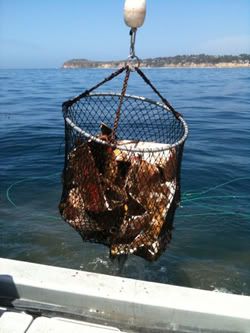
photo credit Discovery News
"No one at present knows who dumped the toilets and tires.
But everyone can help clean up California's underwater coast by reporting sightings of lost fishing gear or loss of gear to (888) 491-GEAR (calls are toll-free) or to www.lostfishinggear.org."
Full article here (Discovery News)
"Over 300 discarded toilets, along with other unusual garbage, have been discovered at a reef off California's Malibu coast."
Um...what?
The University of California Davis Wildlife Health Center and California Lost Fishing Gear Recovery Project are teaming up to remove the junk. Since May 2006, they have removed 17 tons of commercial and 1,400 pounds of recreational fishing gear. However, this is the first time they have removed items such as these, which included about 300 tires in addition to the toilets and other garbage.

photo credit Discovery News
"No one at present knows who dumped the toilets and tires.
But everyone can help clean up California's underwater coast by reporting sightings of lost fishing gear or loss of gear to (888) 491-GEAR (calls are toll-free) or to www.lostfishinggear.org."
Full article here (Discovery News)
Fury and Despair as BP Admits Oil could Leak for Months - The Guardian
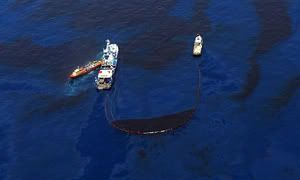
photo credit The Guardian via Win McNamee and Getty Images
"Top kill" has failed. Over the holiday weekend BP shut down their attempts to plug the leak spewing 12,000 to 19,000 barrels of oil per day into the Gulf of Mexico. The company has now switched its efforts to another capping strategy that should capture at least some of the oil.
But this was admitted to have "no certainty" of success, and BP administrator Carol Browner stated "There could be oil coming up till August when the relief wells are done."
President Obama has called the event "enraging and heartbreaking," and I think a familiar sentiment is being felt by people across the nation and - perhaps the world - as oil continues to pollute the environment, kill off marine life and birds and rob people of their jobs.
Browner said: "We are prepared for the worst. We have been prepared from the beginning."
Then why didn't you fucking do anything? Great job, BP.
Full article here (The Guardian)
Friday, 28 May 2010
Success of 'Top Kill' Attempt Remains Uncertain, BP Official Says - Washington Post
So, BP went ahead with the "top kill" method.
"Coast Guard Adm. Thad Allen, the national incident commander for the federal government, said in media interviews that the top kill was working as planned and that oil and gas were no longer leaking."
Phew. But don't get too excited, folks. It will take 24 to 48 hours to know if it's actually working. Additionally, if you've been watching BP's live feed, you might have noticed:
"The flow from the damaged riser pipe has turned muddy, suggesting that oil and gas are no longer leaking. "What you've been observing out of the top of that riser is most likely mud," BP Chief Operating Officer Doug Suttles said Wednesday night. "We can't fully confirm that because we can't sample it."
Meanwhile, the spill has been officially named the country's worst. Estimates suggest between 504,000 and 798,000 gallons of oil have been leaked into the Gulf of Mexico per day for almost 40 days now.
"Figuring that the leak began when the Deepwater Horizon drilling rig sank to the gulf bottom April 22, and subtracting the oil siphoned from the leaking pipe and pumped onto a barge, the flow rate would mean that between 17 million and 27 million gallons of oil have polluted the gulf. The 1989 Exxon Valdez spill, by comparison, put 11 million gallons of oil along more than a thousand miles of Alaska's coastline."
That's some ultra-bad news. Alaska is still suffering from the 1989 spill 21 years later. What does that mean for the Gulf of Mexico?
***Update***
It's both kinda annoying and kinda exciting when an article changes while you're actually writing about it!
New title: "BP: 'Top Kill' Fails to Stop Flow So Far"
I'm watching the live feed now and wondering what the hell they're doing. I don't see the muddy gushing anymore, but there's definitely a robot party going on down there.
So far, the 'top kill' method has failed. BP says they will try again later tonight (maybe that's what they're doing now?).
Full article here (Washington Post)
Check this link for updates!!
"Coast Guard Adm. Thad Allen, the national incident commander for the federal government, said in media interviews that the top kill was working as planned and that oil and gas were no longer leaking."
Phew. But don't get too excited, folks. It will take 24 to 48 hours to know if it's actually working. Additionally, if you've been watching BP's live feed, you might have noticed:
"The flow from the damaged riser pipe has turned muddy, suggesting that oil and gas are no longer leaking. "What you've been observing out of the top of that riser is most likely mud," BP Chief Operating Officer Doug Suttles said Wednesday night. "We can't fully confirm that because we can't sample it."
Meanwhile, the spill has been officially named the country's worst. Estimates suggest between 504,000 and 798,000 gallons of oil have been leaked into the Gulf of Mexico per day for almost 40 days now.
"Figuring that the leak began when the Deepwater Horizon drilling rig sank to the gulf bottom April 22, and subtracting the oil siphoned from the leaking pipe and pumped onto a barge, the flow rate would mean that between 17 million and 27 million gallons of oil have polluted the gulf. The 1989 Exxon Valdez spill, by comparison, put 11 million gallons of oil along more than a thousand miles of Alaska's coastline."
That's some ultra-bad news. Alaska is still suffering from the 1989 spill 21 years later. What does that mean for the Gulf of Mexico?
***Update***
It's both kinda annoying and kinda exciting when an article changes while you're actually writing about it!
New title: "BP: 'Top Kill' Fails to Stop Flow So Far"
I'm watching the live feed now and wondering what the hell they're doing. I don't see the muddy gushing anymore, but there's definitely a robot party going on down there.
So far, the 'top kill' method has failed. BP says they will try again later tonight (maybe that's what they're doing now?).
Full article here (Washington Post)
Check this link for updates!!
Thursday, 27 May 2010
Gulf of Mexico Oil Spill: 'I Let People Down', Admits BP Chief Tony Hayward - Telegraph

photo credit Telegraph via Justin Thomas
Ya think?
Tony Hayward isn't America's favorite person right now, and I'd like to think he isn't the UK's favorite (favourite?) either, although I haven't heard much on their end. Honestly I'd like to think he's no one's favorite/favourite right now.
BP has come under fire for speculation that cost-cutting may have led to the Gulf catastrophe. "A series of failures" including fluid leaks replaced by simple saltwater rather than specialized fluids contributed to the explosion and sinking of the Deepwater Horizon in April. If they were cost-cutting, the joke's on them because legal experts have stated that "the company could now face effectively unlimited fines."
Full article here (Telegraph)
BP-Owned Alaska Oil Pipeline Shut After Spill - Reuters
Wait, what? Another one?
A power outage during a fire-command system test triggered the opening of relief valves at a BP-owned pipeline in Alaska on Tuesday. Oil overflowed from the pipeline into storage tanks and onwards into a secondary container. The volume of spilled oil is unknown, but estimated at several thousand barrels. Thankfully, it seems it was all contained by backup systems.
BP's having a rough time, huh?
Full article here (Reuters)
A power outage during a fire-command system test triggered the opening of relief valves at a BP-owned pipeline in Alaska on Tuesday. Oil overflowed from the pipeline into storage tanks and onwards into a secondary container. The volume of spilled oil is unknown, but estimated at several thousand barrels. Thankfully, it seems it was all contained by backup systems.
BP's having a rough time, huh?
Full article here (Reuters)
Obama Defends Response to Gulf Oil Spill, Pledges to 'Shut This Down' - Fox News

photo credit Fox News
Maybe we'll see some real progress now. 'Bams is taking the oil spill under his control, and honestly I think he can do a better job. He's not my favorite person in the world, but at least he doesn't have as many ulterior motives. BP has proven that they don't know what the hell they're doing and their credibility has been smashed...so maybe this is a step in the right direction. One problem:
"Obama said response teams are using the "best science" to plug the leak, but stressed that BP, not the federal government, has the "superior technology" to get the job done. He said the federal government is taking "full advantage" of that expertise."
We're still following BP's lead. The government does now, however, have the authority to direct BP's actions.
"He added that BP will pay "every dime" for the damage it has done to the coastal communities.
"BP is responsible for this horrific disaster and we will hold them fully accountable on behalf of the United States," Obama said. I'd love to believe this, but who doesn't see a big settlement coming? Unfortunately oil companies still have major influence, and I'd be willing to bet BP gets off the hook - at least partially.
In good news, the Obama administration has extended the moratorium on new deepwater drilling permits for at least six months. Additionally, the drilling planned to take place off the coast of Alaska has been suspended, and the further lease sales off Virginia and in the Gulf have been cancelled.
Full article here (Fox News)
Diving into the Gulf's Toxic Soup - ABC News
Philippe Cousteau went diving with ABC news into the oil slick spilled by BP's Deepwater Horizon rig.
"This is a nightmare...a nightmare," he said.
He's never seen anything like it. Dispersant COREXIT 9500 has been mixing with the oil and sinking down slowly to the sea floor, where experts say it has already killed a quarter of marine life. There have been reports of oil-dispersant blobs suspended at various depths throughout the affected area. Divers had to don hazmat suits to get a glimpse of the spill that we haven't seen yet. This is a must see!!!
Video here (ABC News)
"This is a nightmare...a nightmare," he said.
He's never seen anything like it. Dispersant COREXIT 9500 has been mixing with the oil and sinking down slowly to the sea floor, where experts say it has already killed a quarter of marine life. There have been reports of oil-dispersant blobs suspended at various depths throughout the affected area. Divers had to don hazmat suits to get a glimpse of the spill that we haven't seen yet. This is a must see!!!
Video here (ABC News)
Wednesday, 26 May 2010
BP Nears Decision on 'Top Kill' Procedure - CNN
BP Chief Executive Officer Tony Hayward is interviewed by CNN's American Morning in the video accompanying this article. Some excellent questions were raised:
"We keep hearing that efforts to stop the flow of oil out of that well have never been tried before at this depth, which prompts the question: Why did you ever drill that well if you didn't have an adequate disaster plan in place?"
"A series of failures suggests that somewhere along the line, somebody could have done something to shut [the well] down...And the question many people have is Why wasn't it shut down at the first sign of trouble?"
Unfortunately, Hayward could only repeat the same few sentences over and over again in response, offering no answers to these important questions.
BP will reach a decision later today about whether or not to go ahead with their "top kill" procedure, which will pump 50,000 lbs of "thick, viscous fluid twice the density of water" into the leak site to stop the flow of oil. But residents of the affected areas are getting impatient, and rightly so after nearly 40 days:
""Everything is dying," one woman said at a town hall meeting held between residents, BP officials and the US Coast Guard. "How can you honestly tell us that our Gulf is resilient and will bounce back? Because not one of you up here has a hint as to what is going to happen to our Gulf. You sit up here with a straight face and act like you know when you don't know."
"If the thing is not fixed today, the president doesn't have a choice, and he better go in and completely take over, perhaps with the military in charge," said Sen. Bill Nelson, D-Florida."
President Obama seems disappointed in both BP and current US energy sources' resistance to weaning the country off fossil fuels, saying "We've been putting it off for decade after decade after decade, and it is about time that we said to ourselves that we're ready to make a change on behalf of the future of our children and our grandchildren."
Full article here (CNN)
"We keep hearing that efforts to stop the flow of oil out of that well have never been tried before at this depth, which prompts the question: Why did you ever drill that well if you didn't have an adequate disaster plan in place?"
"A series of failures suggests that somewhere along the line, somebody could have done something to shut [the well] down...And the question many people have is Why wasn't it shut down at the first sign of trouble?"
Unfortunately, Hayward could only repeat the same few sentences over and over again in response, offering no answers to these important questions.
BP will reach a decision later today about whether or not to go ahead with their "top kill" procedure, which will pump 50,000 lbs of "thick, viscous fluid twice the density of water" into the leak site to stop the flow of oil. But residents of the affected areas are getting impatient, and rightly so after nearly 40 days:
""Everything is dying," one woman said at a town hall meeting held between residents, BP officials and the US Coast Guard. "How can you honestly tell us that our Gulf is resilient and will bounce back? Because not one of you up here has a hint as to what is going to happen to our Gulf. You sit up here with a straight face and act like you know when you don't know."
"If the thing is not fixed today, the president doesn't have a choice, and he better go in and completely take over, perhaps with the military in charge," said Sen. Bill Nelson, D-Florida."
President Obama seems disappointed in both BP and current US energy sources' resistance to weaning the country off fossil fuels, saying "We've been putting it off for decade after decade after decade, and it is about time that we said to ourselves that we're ready to make a change on behalf of the future of our children and our grandchildren."
Full article here (CNN)
UN Fish Stocks Review Opens with Dire Outlook - Associated Press
The world's fish stocks are not looking good. The UN has estimated that 75% of stocks fished on the high seas are overfished and in danger of collapse. This is particularly bad for the 3 billion people (half of the planet) who depend on fish as the main protein source in their diets.
Species especially at risk of collapse are larger fish with long lifespans and low fertility rates, namely tuna and sharks.
"Palau's U.N. Ambassador Stuart Beck said the killing of 73 million sharks a year, just because people like the way their fins taste in soup, shows just how badly wrong things have gotten with ocean mismanagement.
"The key is not to focus on the numbers so much as the fact that if we extrapolate these data the estimates are that global fisheries will crash, completely crash, by 2050, in little more than one generation," said Susan Lieberman, international policy director for the Pew Environment Group.
So how is an environmentally-conscious seafood lover supposed to enjoy a nice meal without feeling like he or she is contributing to the problem? Check out this post about buying your seafood sustainably!
Full article here (Associated Press via Google)
Species especially at risk of collapse are larger fish with long lifespans and low fertility rates, namely tuna and sharks.
"Palau's U.N. Ambassador Stuart Beck said the killing of 73 million sharks a year, just because people like the way their fins taste in soup, shows just how badly wrong things have gotten with ocean mismanagement.
"The key is not to focus on the numbers so much as the fact that if we extrapolate these data the estimates are that global fisheries will crash, completely crash, by 2050, in little more than one generation," said Susan Lieberman, international policy director for the Pew Environment Group.
So how is an environmentally-conscious seafood lover supposed to enjoy a nice meal without feeling like he or she is contributing to the problem? Check out this post about buying your seafood sustainably!
Full article here (Associated Press via Google)
Tuesday, 25 May 2010
Oil Spill to Wipe Out Gulf's Sperm Whales? - National Geographic
More bad news for marine mammals:
"If the Gulf of Mexico oil spill kills just three sperm whales, it could seriously endanger the long-term survival of the Gulf's native whale population, scientists say."
Sperm whales are an endangered species anyhow, but the Gulf population is especially threatened, because its numbers are so small. Currently, there are between 1,400 and 1,660 sperm whales living in the Gulf year-round. Subtract just three from that figure, and the populations long-term survival is at risk.
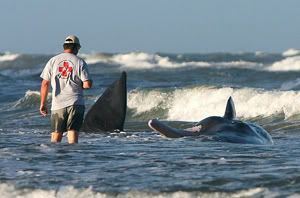
photo credit Rachel Denny Clow via National Geographic
The whales have a high chance of exposure to the oil because they must surface to breathe. If they come up for air in an oil slick, they could potentially suck in oil or breathe the toxic fumes that accompany it - which can be powerful enough to make adult whales pass out and drown! There is also the risk of their food sources being contaminated with oil, mainly fish and squid.
Experts are worried this may be a repeat of what happened to the killer whales after the Exxon Valdez spill in Alaska, where so many females died that the population still hasn't been able to recover - and likely never will.
Full article here (National Geographic)
"If the Gulf of Mexico oil spill kills just three sperm whales, it could seriously endanger the long-term survival of the Gulf's native whale population, scientists say."
Sperm whales are an endangered species anyhow, but the Gulf population is especially threatened, because its numbers are so small. Currently, there are between 1,400 and 1,660 sperm whales living in the Gulf year-round. Subtract just three from that figure, and the populations long-term survival is at risk.

photo credit Rachel Denny Clow via National Geographic
The whales have a high chance of exposure to the oil because they must surface to breathe. If they come up for air in an oil slick, they could potentially suck in oil or breathe the toxic fumes that accompany it - which can be powerful enough to make adult whales pass out and drown! There is also the risk of their food sources being contaminated with oil, mainly fish and squid.
Experts are worried this may be a repeat of what happened to the killer whales after the Exxon Valdez spill in Alaska, where so many females died that the population still hasn't been able to recover - and likely never will.
Full article here (National Geographic)
Crude Awakening – InfoGraphicWorld
This is just something you have to see for yourself. It’s a little outdated, but check out this InfoGraphic on the Gulf Coast oil spill. Lots of information, a little overwhelming…but then again so is the situation, right?
I love these kinds of things.
InfoGraphic here (InfoGraphicWorld)
I love these kinds of things.
InfoGraphic here (InfoGraphicWorld)
Saturday, 22 May 2010
Vaquita: Will a Tiny Porpoise Be the Next Endangered Species to Go? - TakePart
"With the arrival of Endangered Species Day, it’s time to shed some light on a startling reality: the world’s most critically endangered marine mammal is a species you’ve never heard of that lives just a day's drive south of the U.S. border."
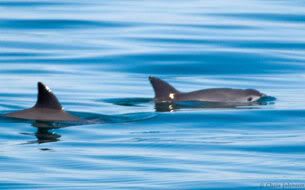
photo credit TakePart via Chris Johnson
The poor little vaquita. It's a tiny little porpoise that lives in the Gulf of California near Baja. It's cute, it's shy, its name translates to "little cow" (aww!) and it's being killed in gillnets at an alarming rate. Today, only about 200 individuals remain. Because of its elusiveness, the only photos that have been available (until recently) are of dead vaquitas in gillnets.
"Without images like those showing dolphins and whales swimming in—and leaping out of—clear waters, it’s been hard to build an awareness campaign around the vaquita...With that scenario, researchers and conservationists worry that the vaquita will go the way of the baiji, or Yangtze River dolphin, a large species that was declared extinct in 2006 amid chaotic efforts to save it."
But there is good news: "“Basically we don’t have any reason to believe that if we stopped killing them in fishing nets, that the population wouldn’t be able to recover,” says Barbara Taylor, a vaquita expert and conservation biologist with the National Marine Fisheries Service"(NMFS).
The Mexican government has invested $25 million in vaquita conservation, most of it going to research funding and efforts to end the use of gillnets.
Full article here (TakePart)

photo credit TakePart via Chris Johnson
The poor little vaquita. It's a tiny little porpoise that lives in the Gulf of California near Baja. It's cute, it's shy, its name translates to "little cow" (aww!) and it's being killed in gillnets at an alarming rate. Today, only about 200 individuals remain. Because of its elusiveness, the only photos that have been available (until recently) are of dead vaquitas in gillnets.
"Without images like those showing dolphins and whales swimming in—and leaping out of—clear waters, it’s been hard to build an awareness campaign around the vaquita...With that scenario, researchers and conservationists worry that the vaquita will go the way of the baiji, or Yangtze River dolphin, a large species that was declared extinct in 2006 amid chaotic efforts to save it."
But there is good news: "“Basically we don’t have any reason to believe that if we stopped killing them in fishing nets, that the population wouldn’t be able to recover,” says Barbara Taylor, a vaquita expert and conservation biologist with the National Marine Fisheries Service"(NMFS).
The Mexican government has invested $25 million in vaquita conservation, most of it going to research funding and efforts to end the use of gillnets.
Full article here (TakePart)
BP: Oil Leak Could be Stopped by Next Week - CNN
I love how Larry King jumps right down Bo Dudley's throat.
"Why so late with us seeing those films, and what's the story with the 5,000 barrels?"
Doesn't even say "hello." Love it.
Bo Dudley is the BP Managing Director right now, and people aren't loving him. BP has finally acknowledged what people have been fearing: the leak is bigger than they thought. They declined, however, to estimate exactly how much bigger that is. That's okay, other people will tell us:
Steve Wereley, a professor of mechanical engineering at Purdue University, told CNN's "American Morning" that the spill could be as big as 20,000 to 100,000 barrels a day.
Ugh.
"I think now we are beginning to understand that we cannot trust BP. People do not trust the experts any longer," said Congress Representative Ed Markey, who leads a House subcommittee investigating the spill. "BP has lost all credibility. Now the decisions will have to be made by others, because it is clear that they have been hiding the actual consequences of this spill."
The Obama administration has ordered BP to release all of its data related to the oil spill. Homeland Security Secretary Janet Napolitano and Environmental Protection Agency (EPA) Administrator Lisa Jackson stated in a letter to BP Group CEO Tony Hayward that "The public and the United States government are entitled to nothing less than complete transparency in this matter," and I agree! They are the ones that will have to deal with the lasting effects of the spill. What does BP care? They're not even based in the United States. (BP = British Petroleum, just in case anyone didn't know)
The EPA is concerned that the chemical dispersant BP has chosen is too toxic for use in the volumes needed. Corexit 9500 has been known to cause skin and eye irritation, as well as irritation of the respiratory tract. BP has been instructed to pick another of the EPA's 18 approved dispersants, and should be applying it within the next day or two. EPA stated:
"Because of its use in unprecedented volumes and because much is unknown about the underwater use of dispersants, EPA wants to ensure BP is using the least toxic product authorized for use. We reserve the right to discontinue the use of this dispersant method if any negative impacts on the environment outweigh the benefits."
BP's next move is to try to plug up the leak with a heavy liquid/mud substance. If this works, the well will be cemented shut and closed down.
BP has posted live footage of the leak from an ROV monitoring the site. You can see that here, or just go to http://www.bp.com and click on the "live stream" link. While you're there, check out how BP has put together a nice little slideshow of all the "good" they're doing to help the situation. It's funny, downplaying the event and lying about what's actually going on isn't in there. They must have forgotten.
When asked when this will all end, Bo Dudley only mentioned that it was being worked on and that "You have to do this without emotion." Check.
Full article here (CNN)
I believe this link is continually updated, or at least it has been up until now, so this will be a good one to keep checking.
"Why so late with us seeing those films, and what's the story with the 5,000 barrels?"
Doesn't even say "hello." Love it.
Bo Dudley is the BP Managing Director right now, and people aren't loving him. BP has finally acknowledged what people have been fearing: the leak is bigger than they thought. They declined, however, to estimate exactly how much bigger that is. That's okay, other people will tell us:
Steve Wereley, a professor of mechanical engineering at Purdue University, told CNN's "American Morning" that the spill could be as big as 20,000 to 100,000 barrels a day.
Ugh.
"I think now we are beginning to understand that we cannot trust BP. People do not trust the experts any longer," said Congress Representative Ed Markey, who leads a House subcommittee investigating the spill. "BP has lost all credibility. Now the decisions will have to be made by others, because it is clear that they have been hiding the actual consequences of this spill."
The Obama administration has ordered BP to release all of its data related to the oil spill. Homeland Security Secretary Janet Napolitano and Environmental Protection Agency (EPA) Administrator Lisa Jackson stated in a letter to BP Group CEO Tony Hayward that "The public and the United States government are entitled to nothing less than complete transparency in this matter," and I agree! They are the ones that will have to deal with the lasting effects of the spill. What does BP care? They're not even based in the United States. (BP = British Petroleum, just in case anyone didn't know)
The EPA is concerned that the chemical dispersant BP has chosen is too toxic for use in the volumes needed. Corexit 9500 has been known to cause skin and eye irritation, as well as irritation of the respiratory tract. BP has been instructed to pick another of the EPA's 18 approved dispersants, and should be applying it within the next day or two. EPA stated:
"Because of its use in unprecedented volumes and because much is unknown about the underwater use of dispersants, EPA wants to ensure BP is using the least toxic product authorized for use. We reserve the right to discontinue the use of this dispersant method if any negative impacts on the environment outweigh the benefits."
BP's next move is to try to plug up the leak with a heavy liquid/mud substance. If this works, the well will be cemented shut and closed down.
BP has posted live footage of the leak from an ROV monitoring the site. You can see that here, or just go to http://www.bp.com and click on the "live stream" link. While you're there, check out how BP has put together a nice little slideshow of all the "good" they're doing to help the situation. It's funny, downplaying the event and lying about what's actually going on isn't in there. They must have forgotten.
When asked when this will all end, Bo Dudley only mentioned that it was being worked on and that "You have to do this without emotion." Check.
Full article here (CNN)
I believe this link is continually updated, or at least it has been up until now, so this will be a good one to keep checking.
Thursday, 20 May 2010
Costner and the Oil Spill
In a weird but potentially good twist, Kevin Costner has apparently spent years and millions of dollars since the 1989 Exxon Valdez spill creating a machine that can deal with oil spills. The 300 machines, named "Ocean Therapy," are essentially giant sophisticated centrifuges that can handle large amounts of water. One of the larger models can treat 200 gallons of water a minute, which - as Costner's business partner John Houghtaling mentioned - is faster than the well is leaking.
The machines work by being placed on a barge in the spill area. They suck in large amounts of the contaminated water, separate out the oil, and spit back the cleaned water into the sea. It is able to return sea water that is 97% cleaner.
BP has agreed to test six of the Ocean Therapy machines this week. Honestly, I hope they work. This could have a really great outcome!
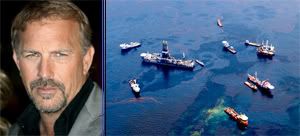
image sourced via NY Daily News, Brown/Getty & Beltra/Greenpeace
In other news, The Big Picture at Boston.com has posted 40 new photos from the spill site and surrounding areas. Some of them are strangely beautiful, but all of them are a sobering reminder of how much damage a spill like this can do. I highly recommend you check them out here.
Also, Russia Today has posted footage of the BP gas burn-off, which people have been asking to see. That is available here.
Main article here (NY Daily News)
The machines work by being placed on a barge in the spill area. They suck in large amounts of the contaminated water, separate out the oil, and spit back the cleaned water into the sea. It is able to return sea water that is 97% cleaner.
BP has agreed to test six of the Ocean Therapy machines this week. Honestly, I hope they work. This could have a really great outcome!

image sourced via NY Daily News, Brown/Getty & Beltra/Greenpeace
In other news, The Big Picture at Boston.com has posted 40 new photos from the spill site and surrounding areas. Some of them are strangely beautiful, but all of them are a sobering reminder of how much damage a spill like this can do. I highly recommend you check them out here.
Also, Russia Today has posted footage of the BP gas burn-off, which people have been asking to see. That is available here.
Main article here (NY Daily News)
Crews Fish Out Lost Nets to Save Trapped Wildlife - USA Today
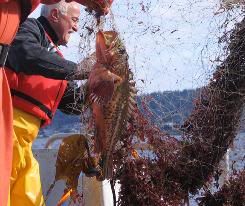
photo credit USA Today via Bryan DeLong
The problem with lost fishing gear? It keeps fishing.
"Ghost nets" are fishing nets that have been lost at sea due to accident, damage or storms. They drift freely through the water, capturing and killing any animal unfortunate enough to become entangled. The victims can be fish, sharks, invertebrates, sea turtles, and marine mammals such as seals and whales.
The cycle is potentially endless: Nets will be lost at sea, fish will become entangled and killed. The weight of all the dead biomass makes the net sink to the bottom, which attracts scavengers who may themselves become entangled. Once enough dead material has been eaten away, the net will rise up and begin to float through the sea again, capturing and killing indiscriminately. And over, and over. The Northwest Straits Marine Conservation Initiative in Washington State has retrieved 2,775 nets with close to 54,000 dead animals entangled. And that's just since 2002.
But it's not just nets - crab pots, fish traps and lobster gear gets lost too, and it continues to work. The Virginia Marine Resources Commission pulled over 9,000 crab pots from Chesapeake Bay last winter and found 9,800 animals trapped.
But there is a silver lining. Covanta Energy Corp., National Fish and Wildlife Foundation Washington (NFWF), National Oceanic and Atmospheric Administration (NOAA) and Schnitzer Steel have come together to offer fisherman a free way to dispose of aged fishing gear responsibly. It is collected from 19 ports in seven states, and either recycled by Schnitzer or converted into power by Covanta's energy-from-waste facility, which I think is pretty cool.
Full article here (USA Today)
The 7 Most Ridiculous Things Rush Limbaugh Has Said About BP’s Oil Spill - EcoPolitology
Probably no one reading this likes Rush Limbaugh. I'm sure you all have your own reasons. Here's another to add to your list, although I'm sure you've heard.
EcoPolitology made a post today about the seven most ridiculous things he has said about the BP oil spill. Below are my personal favorites:
"6. “This spill is nothing more than an opportunity for the left to continue to attack this country and to attack the people that make this country work.”
5. “It’s natural. It’s as natural as the ocean water is. Well, the turtles may take a hit for a while, but so what?” and… “Sea water is pretty tough stuff… oil has a tough time surviving.”
2. Environmentalist wackos blew up the Deepwater Horizon."
I'm sure you already know what number 1 is. I just have one thing to say in response to Mr. Limbaugh: Weren't you leaving...?

image credit ATicketForRush
Full article here (EcoPolitology)
EcoPolitology made a post today about the seven most ridiculous things he has said about the BP oil spill. Below are my personal favorites:
"6. “This spill is nothing more than an opportunity for the left to continue to attack this country and to attack the people that make this country work.”
5. “It’s natural. It’s as natural as the ocean water is. Well, the turtles may take a hit for a while, but so what?” and… “Sea water is pretty tough stuff… oil has a tough time surviving.”
2. Environmentalist wackos blew up the Deepwater Horizon."
I'm sure you already know what number 1 is. I just have one thing to say in response to Mr. Limbaugh: Weren't you leaving...?

image credit ATicketForRush
Full article here (EcoPolitology)
Sustainable Seafood
Let's take a moment to remind ourselves about buying our seafood sustainably. I find marine biologists funny, in that they are just about the only biologists who pretty much unanimously enjoy eating their subjects of study. You don't really see rain forest ecologists eating toucans, or veterinarians eating cats and dogs...But marine biologists? We love us some fish.
Buying seafood sustainably, though, is quite tricky - even for the most attentive and well-meaning of us. Shops tend to only display the price and the name of the fish, which can be known by several different names locally. It's hard to know what the actual fish you're buying is, and where it came from. For example: if you bought rock salmon, you wouldn't think you were buying an endangered species of shark, but you might be.
Thankfully, FishOnline makes it a little easier for us. Set up by the Marine Conservation Society (MCS) in the United Kingdom, FishOnline has many tools users can take advantage of to gauge whether the fish you're buying is sustainable or not. Users can enter the name of any fish into the Search field and pull up either simple results overviewing the species or advanced information such as stock health and method of capture. This site was designed with UK shoppers in mind, but recognizing that many species are fished in one part of the world and sold in others, the information here can be used by pretty much anyone. I have found it just as helpful when shopping in the US.
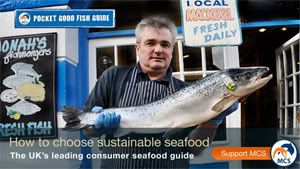
image credit MCS
Another notable tool is the Fish Purchasing Guide under the "Buying & Eating" tab. This displays a year-long calendar illustrating the best times to buy and to avoid buying your favorite fish, taking seasonal spawning into account. Below the calendar is a chart with more information about where the fish are sourced from, minimum landing size, and the best possible choice when it comes to making a purchase.
But don't worry, if that's too confusing for you to follow, FishOnline has prepared two simple lists of Fish to Avoid, and Fish to Eat! They even have a handy print-out Pocket Good Fish Guide to take with you on your next grocery trip! It fits right in your wallet, and the key is simple; fishes marked in green are the best choices, fishes marked in yellow are at risk of becoming unsustainable and should be bought with caution, and those marked in red are fish to avoid from unsustainable and overfished species.
Super helpful, super easy. So grab your reusable shopping bags, print yourself a Pocket Good Fish Guide, and get some fish at your favorite local or sustainable market tonight! yum!
More info here:
MCS
FishOnline
Buying seafood sustainably, though, is quite tricky - even for the most attentive and well-meaning of us. Shops tend to only display the price and the name of the fish, which can be known by several different names locally. It's hard to know what the actual fish you're buying is, and where it came from. For example: if you bought rock salmon, you wouldn't think you were buying an endangered species of shark, but you might be.
Thankfully, FishOnline makes it a little easier for us. Set up by the Marine Conservation Society (MCS) in the United Kingdom, FishOnline has many tools users can take advantage of to gauge whether the fish you're buying is sustainable or not. Users can enter the name of any fish into the Search field and pull up either simple results overviewing the species or advanced information such as stock health and method of capture. This site was designed with UK shoppers in mind, but recognizing that many species are fished in one part of the world and sold in others, the information here can be used by pretty much anyone. I have found it just as helpful when shopping in the US.

image credit MCS
Another notable tool is the Fish Purchasing Guide under the "Buying & Eating" tab. This displays a year-long calendar illustrating the best times to buy and to avoid buying your favorite fish, taking seasonal spawning into account. Below the calendar is a chart with more information about where the fish are sourced from, minimum landing size, and the best possible choice when it comes to making a purchase.
But don't worry, if that's too confusing for you to follow, FishOnline has prepared two simple lists of Fish to Avoid, and Fish to Eat! They even have a handy print-out Pocket Good Fish Guide to take with you on your next grocery trip! It fits right in your wallet, and the key is simple; fishes marked in green are the best choices, fishes marked in yellow are at risk of becoming unsustainable and should be bought with caution, and those marked in red are fish to avoid from unsustainable and overfished species.
Super helpful, super easy. So grab your reusable shopping bags, print yourself a Pocket Good Fish Guide, and get some fish at your favorite local or sustainable market tonight! yum!
More info here:
MCS
FishOnline
Wednesday, 19 May 2010
Climate Fluke? First Gray Whale in 300 Years Appears in Atlantic - TakePart
This one is good news. Potentially. I think? This one boggles my mind a little.
A single gray whale was spotted by a whale watching boat off the shores of Israel last week. Why is this significant? Gray whales have been extinct from the entire Atlantic Ocean for nearly 300 years - hunted out by whaling.
Is this guy lost? Or does he know what he's doing? It is believed that he traveled through the newly ice-free Northwest Passage in the Arctic to get where he is now, raising questions about how climate change could impact animal migratory routes.
Full article here, video included (TakePart.com):
http://www.takepart.com/news/2010/05/17/more-than-a-fluke-first-gray-whale-appears-in-atlantic-in-300-years-because-of-melting-arctic-sea-ice
A single gray whale was spotted by a whale watching boat off the shores of Israel last week. Why is this significant? Gray whales have been extinct from the entire Atlantic Ocean for nearly 300 years - hunted out by whaling.
Is this guy lost? Or does he know what he's doing? It is believed that he traveled through the newly ice-free Northwest Passage in the Arctic to get where he is now, raising questions about how climate change could impact animal migratory routes.
Full article here, video included (TakePart.com):
http://www.takepart.com/news/2010/05/17/more-than-a-fluke-first-gray-whale-appears-in-atlantic-in-300-years-because-of-melting-arctic-sea-ice
Wednesday, 12 May 2010
Oil & Dispersants Spell Trouble for Florida’s Coral Reefs - NRDC (Natural Resources Defense Council)
As I've mentioned and as it's been published before, the use of oil dispersants doesn't actually eliminate any oil, it just moves it into the water column and away from the surface. This is good news for shore birds, nature sanctuaries and wetlands, but bad news for bottom life such as shellfish and corals, and anything that eats them such as fish, manatees and whales.
"...One of the marine treasures of the nation – the coral ecosystems in and around the Florida Keys – are especially vulnerable to this lethal soup. A 2007 study found that both chemical dispersants and dispersed oil are often much more toxic to corals than oil itself. Dispersants and dispersed oil can result in extensive mortality that manifests itself over months and years."
Check out the link at the bottom of the article directing you to pass on letters to your senators aiming to prevent future oil spills and concentrate on clean sources of energy - 60 seconds that can do a world of good!
Full article here (NRDC):
http://switchboard.nrdc.org/blogs/lspeer/oil_dispersants_spell_trouble.html
"...One of the marine treasures of the nation – the coral ecosystems in and around the Florida Keys – are especially vulnerable to this lethal soup. A 2007 study found that both chemical dispersants and dispersed oil are often much more toxic to corals than oil itself. Dispersants and dispersed oil can result in extensive mortality that manifests itself over months and years."
Check out the link at the bottom of the article directing you to pass on letters to your senators aiming to prevent future oil spills and concentrate on clean sources of energy - 60 seconds that can do a world of good!
Full article here (NRDC):
http://switchboard.nrdc.org/blogs/lspeer/oil_dispersants_spell_trouble.html
Tuesday, 11 May 2010
Shark Meat? Have a Sardine! - IUCN
Shark populations around West Africa are declining due to the shark fishery, including the practice of finning. Senegalese women have traditionally been employed in processing the shark meat from the catches. Recently, the International Union for Conservation of Nature (IUCN) set up a workshop for women to learn about more sustainable and economical species, such as sardines. Sardines are abundant in the area and are affordable to even the most poor communities. The women were taught about hygiene standards, processing techniques and market regulations in order to provide them with a long-term source of sustainable income and opportunities to defend their rights regarding work and finances.
Like I've said before, I'm not really a fan of members of industrialized nations coming into poorer countries and telling people what to do, but it seems to me the IUCN made sure everybody wins here: people, communities and sharks! Great job!

photo credit IUCN
Full article here (IUCN.org):
http://www.iucn.org/iyb/iucn_action_22/success/?5147/Shark-meat-Have-a-sardine
Like I've said before, I'm not really a fan of members of industrialized nations coming into poorer countries and telling people what to do, but it seems to me the IUCN made sure everybody wins here: people, communities and sharks! Great job!

photo credit IUCN
Full article here (IUCN.org):
http://www.iucn.org/iyb/iucn_action_22/success/?5147/Shark-meat-Have-a-sardine
Monday, 10 May 2010
It Won't Save the Whales - LA Times
They're not kidding. Honestly, how is this issue getting so much support? Who wants to re-open commercial whaling? (Besides those already doing it, of course)
The 88 member nations of the International Whaling Commission (IWC) are sending a weak message. Essentially they're being lazy and tip-toeing on eggshells for political reasons - not conservational ones.
"The overall reduction in the whale hunt is based on politically negotiated numbers, not on scientifically derived catch limits. Its quotas come close to numbers that these rogue nations probably would catch anyway. That's like the tale in the book 'The Little Prince' involving a monarch who can make the sun set — but only at the time when it would do so anyway."
The article makes a good point - which I'm totally in agreeance with:
"We're not adamantly opposed to the idea of any and all whale hunting. Subsistence whaling by indigenous groups in Alaska and elsewhere kills more than 150 whales a year. Some cultures do not find the use of meat and other whale products any more objectionable than most people find the production of lamb for consumption. It's not the commission's job to pass moral judgment on whether whales are too intelligent or beautiful to hunt; rather, it must take a strong stand on ensuring healthy whale populations, and this proposal fails on several fronts."
Right. I've never been a fan of "the white man" coming into indigenous cultures and saying "Oh hey, we exploited this animal so now you have to stop too, okay?" No. These cultures have been doing this since before we have, and it's part of their subsistence. I love whales - I do. But these aren't the people who are the problem here.
Full article here (LA Times):
http://www.latimes.com/news/opinion/editorials/la-ed-whale-20100508,0,762400.story
The 88 member nations of the International Whaling Commission (IWC) are sending a weak message. Essentially they're being lazy and tip-toeing on eggshells for political reasons - not conservational ones.
"The overall reduction in the whale hunt is based on politically negotiated numbers, not on scientifically derived catch limits. Its quotas come close to numbers that these rogue nations probably would catch anyway. That's like the tale in the book 'The Little Prince' involving a monarch who can make the sun set — but only at the time when it would do so anyway."
The article makes a good point - which I'm totally in agreeance with:
"We're not adamantly opposed to the idea of any and all whale hunting. Subsistence whaling by indigenous groups in Alaska and elsewhere kills more than 150 whales a year. Some cultures do not find the use of meat and other whale products any more objectionable than most people find the production of lamb for consumption. It's not the commission's job to pass moral judgment on whether whales are too intelligent or beautiful to hunt; rather, it must take a strong stand on ensuring healthy whale populations, and this proposal fails on several fronts."
Right. I've never been a fan of "the white man" coming into indigenous cultures and saying "Oh hey, we exploited this animal so now you have to stop too, okay?" No. These cultures have been doing this since before we have, and it's part of their subsistence. I love whales - I do. But these aren't the people who are the problem here.
Full article here (LA Times):
http://www.latimes.com/news/opinion/editorials/la-ed-whale-20100508,0,762400.story
Saturday, 8 May 2010
Jeremy Jackson: How We Wrecked the Ocean - TED.com
This TED Talk features Jeremy Jackson, Ritter Professor of Oceanography and Director of the Center for Marine Biodiversity and Conservation at the Scripps Institution of Oceanography - who paints a grim picture of the environmental decline coral reef ecosystems have gone through in the past 100 - 200 years.
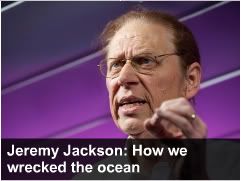
image credit TED.com
As a coral reef ecologist, Jackson has traveled the world studying reefs. While studying in Jamaica, hurricane Alan came through and destroyed a large portion of the reef ecosystem.
"...And we thought well, we're real smart, we know that hurricanes have always happened in the past...And we predicted what would happen, and we got it all wrong...After a natural catastrophe like a hurricane, it used to be that there was some kind of successional sequence of recovery...What's going on now is that over fishing, pollution and climate change are all interacting in a way that prevents that."
What particularly caught my attention were the photos comparing sport fishing out of Key West, Florida from the 1950's and today. What's even more shocking are the photos from recent trawling sites, a type of fishing that can be compared to oceanic bulldozing.
"In the final analysis, the thing we really need to fix is ourselves. It's not about the fish, it's not about the pollution, it's not about the climate change. It's about us, and our greed, and our need for growth, and our inability to imagine a world which is different from the selfish world that we live in today. So the question is, will we respond to this, or not?"
Video here (Ted.com):
http://www.ted.com/talks/jeremy_jackson.html

image credit TED.com
As a coral reef ecologist, Jackson has traveled the world studying reefs. While studying in Jamaica, hurricane Alan came through and destroyed a large portion of the reef ecosystem.
"...And we thought well, we're real smart, we know that hurricanes have always happened in the past...And we predicted what would happen, and we got it all wrong...After a natural catastrophe like a hurricane, it used to be that there was some kind of successional sequence of recovery...What's going on now is that over fishing, pollution and climate change are all interacting in a way that prevents that."
What particularly caught my attention were the photos comparing sport fishing out of Key West, Florida from the 1950's and today. What's even more shocking are the photos from recent trawling sites, a type of fishing that can be compared to oceanic bulldozing.
"In the final analysis, the thing we really need to fix is ourselves. It's not about the fish, it's not about the pollution, it's not about the climate change. It's about us, and our greed, and our need for growth, and our inability to imagine a world which is different from the selfish world that we live in today. So the question is, will we respond to this, or not?"
Video here (Ted.com):
http://www.ted.com/talks/jeremy_jackson.html
Thursday, 6 May 2010
Gulf Oil Spill Update
Obama has called the spill "a potentially unprecedented environmental disaster,” but so far it's not the worst of our time. The Exxon Valdez spill of 1989 leaked an estimated 10.8 million gallons off the coast of Alaska. The Ixtoc I in Mexico spilled 140 million gallons in 1979. In 1991 Iraqi forces spilled 36 billion gallons retreating from Kuwait. The Deepwater Horizon hasn't yet reached any of these numbers, but that's not to say this is no big deal. It is. What's scaring people the most is the fact that no one knows how this will play out.
"As one expert put it, this is the first inning of a nine-inning game. No one knows the final score.
Edward B. Overton of Louisiana State University says “Right now what people are fearing has not materialized.”
Jacqueline Savits of Oceana disagrees:
“Some people are saying, It hasn’t gotten to shore yet so it’s all good, but a lot of animals live in the ocean, and a spill like this becomes bad for marine life as soon as it hits the water. You have endangered sea turtles, the larvae of bluefin tuna, shrimp and crabs and oysters, grouper. A lot of these are already being affected and have been for 10 days. We’re waiting to see how bad it is at the shore, but we may never fully understand the full impacts on ocean life.”
The National Wildlife Federation spoke to a fisherman out of Venice, Louisiana who had been to the slick. He brought back a plastic bottle filled with the oil and mentioned that he was concerned for the state's wildlife.
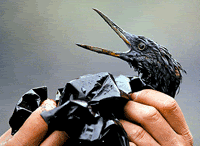
photo credit EarthShare
BP is working to apply dispersants directly to the leak site. The sooner they hit the oil, the better. Engineers are also constructing huge containment domes to trap the leaking oil so that it can be collected and shipped to shore. Additionally, BP is creating a relief well by drilling at an angle into the main Deepwater Horizon well.
EarthShare has prepared a list of helpful things you and I can do in response to the spill - from volunteering for cleanup to tweeting about the event. You can see that list here. Pick your favorite and help out!!
Main article here (New York Times):
http://www.nytimes.com/2010/05/04/science/earth/04enviro.html?partner=rss&emc=rss
"As one expert put it, this is the first inning of a nine-inning game. No one knows the final score.
Edward B. Overton of Louisiana State University says “Right now what people are fearing has not materialized.”
Jacqueline Savits of Oceana disagrees:
“Some people are saying, It hasn’t gotten to shore yet so it’s all good, but a lot of animals live in the ocean, and a spill like this becomes bad for marine life as soon as it hits the water. You have endangered sea turtles, the larvae of bluefin tuna, shrimp and crabs and oysters, grouper. A lot of these are already being affected and have been for 10 days. We’re waiting to see how bad it is at the shore, but we may never fully understand the full impacts on ocean life.”
The National Wildlife Federation spoke to a fisherman out of Venice, Louisiana who had been to the slick. He brought back a plastic bottle filled with the oil and mentioned that he was concerned for the state's wildlife.

photo credit EarthShare
BP is working to apply dispersants directly to the leak site. The sooner they hit the oil, the better. Engineers are also constructing huge containment domes to trap the leaking oil so that it can be collected and shipped to shore. Additionally, BP is creating a relief well by drilling at an angle into the main Deepwater Horizon well.
EarthShare has prepared a list of helpful things you and I can do in response to the spill - from volunteering for cleanup to tweeting about the event. You can see that list here. Pick your favorite and help out!!
Main article here (New York Times):
http://www.nytimes.com/2010/05/04/science/earth/04enviro.html?partner=rss&emc=rss
Wednesday, 5 May 2010
Pitiless Slaughter of Magnificent Minke Whales for Meat No-One Wants: How I Harpooned the Viking Whalers - Mail Online
An English reporter spent a few days on a Norwegian whaling ship to bring us this story, which he describes as "one of the most unpleasant experiences of my life."
Norway is one of the modern whaling nations, and this voyage was in pursuit of the minke whale, the smallest of the baleen species. The whales are killed via a large explosive charge mounted on the tip of a 3ft harpoon. Death is supposed to be instant, but according to this article that is far from the reality.

photo credit Mail Online via David Shukman
The whales are harvested for their fillets alone, and the rest is discarded - tossed back into the sea as waste. What's worse is that no one even wants the meat. The whalers kill more whales than are actually sold at market. The famous whale-eating nation of Japan even turned down the offer of Norway's extra meat, saying it contained too many contaminants such as PCBs (polychlorinated biphenyls, which have been linked to cancer).
Whaler Bjorn Andersen argues that whale meat is good because it is free-range and natural. "You can call it 'organic.'" No, you can't actually. Currently there are no standards for labeling seafood "organic," and since wild seafood cannot be observed or their environments and diets controlled, they cannot be labeled as "organic." Oftentimes seafood will be tainted heavily with environmental pollutants like mercury and PCBs (such as Norway's offering to Japan was).
"I wonder about the real motive behind the killing. There's no single answer, but the national pride of a seafaring nation is a factor; another is the need to woo voters in fishing communities.
It's certainly not about getting meat to Norwegian tables.
I've left the ship with relief and a sense of futility: wasted effort, needless cruelty, pointless slaughter."
Full article here (via Mail Online):
http://www.dailymail.co.uk/news/article-1270382/Pitiless-slaughter-magnificent-minke-whales-meat-wants-How-I-harpooned-viking-whalers.html?ito=feeds-newsxml#ixzz0mtAr8d5a
Norway is one of the modern whaling nations, and this voyage was in pursuit of the minke whale, the smallest of the baleen species. The whales are killed via a large explosive charge mounted on the tip of a 3ft harpoon. Death is supposed to be instant, but according to this article that is far from the reality.

photo credit Mail Online via David Shukman
The whales are harvested for their fillets alone, and the rest is discarded - tossed back into the sea as waste. What's worse is that no one even wants the meat. The whalers kill more whales than are actually sold at market. The famous whale-eating nation of Japan even turned down the offer of Norway's extra meat, saying it contained too many contaminants such as PCBs (polychlorinated biphenyls, which have been linked to cancer).
Whaler Bjorn Andersen argues that whale meat is good because it is free-range and natural. "You can call it 'organic.'" No, you can't actually. Currently there are no standards for labeling seafood "organic," and since wild seafood cannot be observed or their environments and diets controlled, they cannot be labeled as "organic." Oftentimes seafood will be tainted heavily with environmental pollutants like mercury and PCBs (such as Norway's offering to Japan was).
"I wonder about the real motive behind the killing. There's no single answer, but the national pride of a seafaring nation is a factor; another is the need to woo voters in fishing communities.
It's certainly not about getting meat to Norwegian tables.
I've left the ship with relief and a sense of futility: wasted effort, needless cruelty, pointless slaughter."
Full article here (via Mail Online):
http://www.dailymail.co.uk/news/article-1270382/Pitiless-slaughter-magnificent-minke-whales-meat-wants-How-I-harpooned-viking-whalers.html?ito=feeds-newsxml#ixzz0mtAr8d5a
Tuesday, 4 May 2010
Shark Fin Off the Menu in Hawaii - Change.org

photo credit Change.org via Tanaka Juuyoh
So I've been following the bill to protect sharks from finning in Hawaiian waters on Twitter via WhySharksMatter.
This week Hawaiian legislature voted to pass a bill which prohibits the possession, sale and distribution of shark fins in the state (only one opposer!). The bill was introduced by Senator Clayton Hee, who compared finning sharks to killing elephants for their ivory.
Shark finning is the practice of catching a shark and cutting off the fins. The rest of the still-living shark is then thrown back into the sea to die a slow death. Many will drown because most shark species need to keep moving to force water over their gills in order to breathe. Others will literally be eaten alive, unable to swim away from other fish or scavengers; others will starve to death.
Two questions come up around the subject of shark fishing: 1.)"who cares?" and 2.)"aren't we doing ourselves a favor by killing a dangerous animal?"
1.)According to WildAid:
"Sharks play a very important role in the oceans in a way that an average fish does not. Sharks are at the top of the food chain in virtually every part of every ocean. In that role, they keep populations of other fish healthy and in proper proportion for their ecosystem."
2.)According to Change.org:
"Aren't sharks a danger to humans? In a word: No. Based on data from the Florida Museum of Natural History, on average, no more than five people are killed in shark attacks worldwide annually. That's five people killed by sharks, versus 100 million sharks killed by people. Quite an unbalanced ratio.
Actually, shark can be dangerous ... if you eat it. According to studies conducted by Hong Kong Baptist University and WildAid, a quarter of shark fins analyzed had mercury levels higher than the highest allowable standards set by the World Health Organization. And it isn't just mercury, as shark can have high levels of arsenic as well. Ironically, in China, shark fin soup is traditionally thought of as something of a health food. Some believe it is an aphrodisiac, which is even more ironic, as mercury can lead to impotence and loss of sex drive in men."
Interesting.
When asked why concern for tradition and culture did not halt the passing of the bill, Senator Hee explained that in Hawaii, the shark is considered the family guardian - a cultural relationship to humans that has given it sanctuary in Hawaiian waters. Former first lady of Hawaii, Vicky Cayetano, adds: "Sharks are more valuable in the ocean than in soup."
Well said.
Full article here (Change.org):
http://animals.change.org/blog/view/shark_fin_off_the_menu_in_hawaii
Sunday, 2 May 2010
Gulf Oil Spill: Nature Conservancy in Louisiana - Cool Green Science
Keith Ouchley, director of The Nature Conservancy in Louisiana, was interviewed on the BP oil spill hitting Louisiana's shores and what responders are doing about it. What I think is most interesting, and also a great idea, is the fact that state and federal agencies are working on training hundreds of shrimpers and other fisherman on the proper way to deploy inflatable booms, so that while they're on the water they can work to help the situation. The fishermen obviously have a vested interest in cleaning up the spill as fast as possible because their livelihoods are in danger. Louisiana is the largest US producer of shrimp, crab and oysters.
Another concern is that the coastline in this area harbors a very large population of nesting seabirds - who are right in the middle of nesting. Both adults and chicks are in danger.
Full article here (Cool Green Science):
http://blog.nature.org/2010/05/gulf-oil-spill-report-from-louisiana/
Another concern is that the coastline in this area harbors a very large population of nesting seabirds - who are right in the middle of nesting. Both adults and chicks are in danger.
Full article here (Cool Green Science):
http://blog.nature.org/2010/05/gulf-oil-spill-report-from-louisiana/
Saturday, 1 May 2010
Oil Rig Explosion Summary
Mmkay so maybe I've been procrastinating on this one for a few days because it totally bummed me out and I wasn't ready to tackle it. That and the fact that I didn't have internet access when this whole thing happened, so I was poorly informed. Anyway.
I'm sure everyone's heard by now of the BP Deepwater Horizon oil rig explosion in the Gulf of Mexico. This kinda sucks.
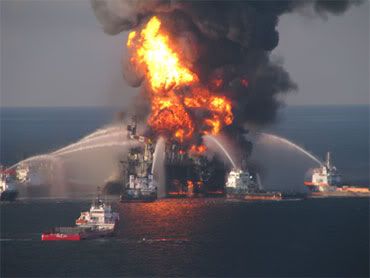
photo credit US Coast Guard
An estimated 210,000 gallons of oil are being leaked into the Gulf per day, threatening literally hundreds of species and at least 10 wildlife refuges or management areas. Among the greater worries are the already endangered population of bluefin tuna and mammals such as dolphins that need to surface for air. Birds are particularly threatened by oil spills because when their feathers are coated with oil they are no longer able to repel water or trap air close to their bodies, resulting in the loss of the ability to keep dry and warm. Many will die of hypothermia.
Menhaden is America's third largest fishery, and the season just opened the day before the spill. They are expected to be particularly at risk due to the fact that they filter out small particles of food to feed on as they swim, which will likely be tainted with oil.
140,000 gallons of chemical dispersants have been used in the area to try to clean up the mess, along with controlled burnings and inflatable booms. Chemical dispersants work by breaking up the slicks into smaller droplets that bacteria and other processes can naturally break down. They don't actually remove any oil from the water, but the smaller particles are more likely to mix into the water column than to float on the surface and contaminate shorelines and surface marine life. This, however, is potentially bad news for bottom life such as shellfish and corals. Responders have said this has been the most effective measure so far. Robots have been used unsuccessfully to try to patch up the leak. Unfortunately, dilution is still the solution to pollution.
"No good answers to a mess this big, only degrees of damage to various life-forms," said Richard Charter, senior policy adviser for marine programs at Defenders of Wildlife.
Rescue workers have begun cleaning birds and assessing the mess...Unfortunately, with the sunken rig still leaking offshore, it looks like the situation right now will only get worse.
Ironically, an award ceremony to celebrate the safety accomplishments of the offshore drilling industry was to be held next week, but had to be postponed due to the spill. Last year BP won for "evacuation capabilities for offshore facilities". This year 11 people were killed.
Full articles here:
600-Plus Species at Risk From Deadly Gulf Oil Spill - AOL News
BP's Gulf of Mexico Oil Spill: What's Under Threat Locally - Telegraph.co.uk
Gulf Oil Spill Fight Turns to Chemicals - National Geographic
Offshore Oil Safety Awards Luncheon Postponed - CBS News
Extra:
Obama Remarks on Oil Spill - ABC News
(He doesn't seem to be taking this too seriously...)
I'm sure everyone's heard by now of the BP Deepwater Horizon oil rig explosion in the Gulf of Mexico. This kinda sucks.

photo credit US Coast Guard
An estimated 210,000 gallons of oil are being leaked into the Gulf per day, threatening literally hundreds of species and at least 10 wildlife refuges or management areas. Among the greater worries are the already endangered population of bluefin tuna and mammals such as dolphins that need to surface for air. Birds are particularly threatened by oil spills because when their feathers are coated with oil they are no longer able to repel water or trap air close to their bodies, resulting in the loss of the ability to keep dry and warm. Many will die of hypothermia.
Menhaden is America's third largest fishery, and the season just opened the day before the spill. They are expected to be particularly at risk due to the fact that they filter out small particles of food to feed on as they swim, which will likely be tainted with oil.
140,000 gallons of chemical dispersants have been used in the area to try to clean up the mess, along with controlled burnings and inflatable booms. Chemical dispersants work by breaking up the slicks into smaller droplets that bacteria and other processes can naturally break down. They don't actually remove any oil from the water, but the smaller particles are more likely to mix into the water column than to float on the surface and contaminate shorelines and surface marine life. This, however, is potentially bad news for bottom life such as shellfish and corals. Responders have said this has been the most effective measure so far. Robots have been used unsuccessfully to try to patch up the leak. Unfortunately, dilution is still the solution to pollution.
"No good answers to a mess this big, only degrees of damage to various life-forms," said Richard Charter, senior policy adviser for marine programs at Defenders of Wildlife.
Rescue workers have begun cleaning birds and assessing the mess...Unfortunately, with the sunken rig still leaking offshore, it looks like the situation right now will only get worse.
Ironically, an award ceremony to celebrate the safety accomplishments of the offshore drilling industry was to be held next week, but had to be postponed due to the spill. Last year BP won for "evacuation capabilities for offshore facilities". This year 11 people were killed.
Full articles here:
600-Plus Species at Risk From Deadly Gulf Oil Spill - AOL News
BP's Gulf of Mexico Oil Spill: What's Under Threat Locally - Telegraph.co.uk
Gulf Oil Spill Fight Turns to Chemicals - National Geographic
Offshore Oil Safety Awards Luncheon Postponed - CBS News
Extra:
Obama Remarks on Oil Spill - ABC News
(He doesn't seem to be taking this too seriously...)
Subscribe to:
Comments (Atom)